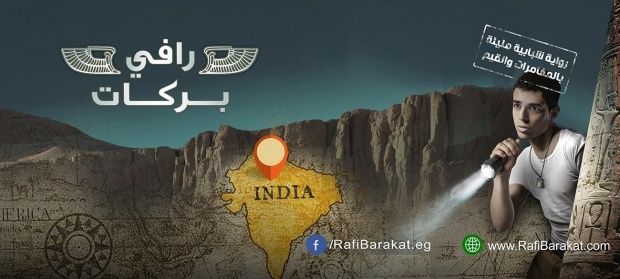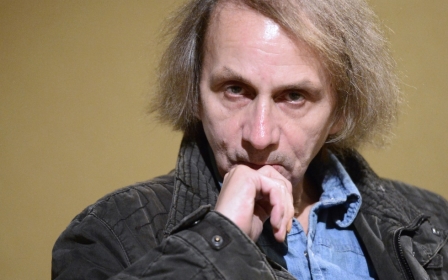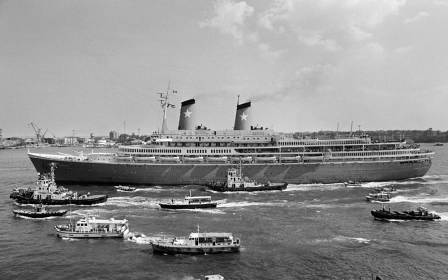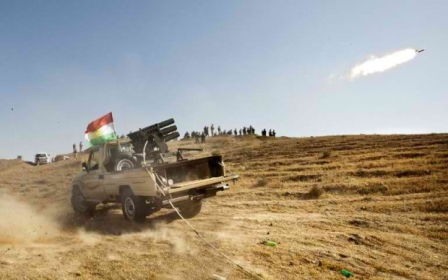Arab world's top televangelist goes on 'novel' trajectory
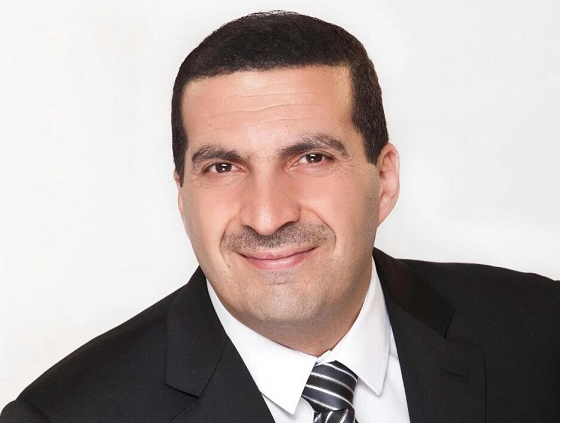
Egyptian preacher Amr Khaled, one of the Arab world’s most popular Muslim televangelists, began 2015 with flair, announcing on New Year's Eve to his followers that his first novel, 'Rafi Barakat', would soon be published.
Shared on billboards in upscale neighbourhoods of Cairo, the book is being marketed as a “novel for the youth, full of adventure, imagination and values. A slick promo video shows a young man on a beach unearthing the book from beneath pebbles and sheilding it under his jacket.
Through the adventures of 14-year-old Rafi, the book’s main character, Khaled says he hopes to present a message of social reform to the Arab youth.
“The Arab world needs a new kind of person. It needs a person who is confident in their abilities, passionate, proactive, upholds values and ethics, and is able to engage with others instead of insulating themselves,” Khaled told MEE.
Rafi – a name derived from the Arabic root word ‘to mend,’ and which also means reformer – is meant to be just that.
Rafi is meant to be a role model that young Arabs and Muslims can follow. Khaled feels that the Arab world is living through a crisis that can only be resolved by cultivating a new kind of person, a passionate and hardworking individual.
“Rafi is a passionate guy, he wants to be successful, he upholds morals and is open to the world. While his capabilities may be limited in the face of the challenges around him, he is determined to realise his dreams,” Khaled told Middle East Eye.
Inspired by the success of J K Rowling’s Harry Potter, Khaled says he is targeting Arab teens between the ages of 15-23 with his 350-page “exciting read which features escapades from Egypt to India and is full of the latest technology and intertwined with ethics.”
Khaled says he is optimistic about the book and envisions ‘Rafi Barakat’ becoming a series and then a movie.
“This will be the first of a series of novels. I hope it will soon become a film that is both entertaining and promoting a message of coexistence and productivity,” he said.
The book will be launched at a Cairo hotel on 10 January, with Nahdat Misr Publishing– the same publisher of Khaled’s previous works, distributing the novel in Egyptian and Gulf markets immediately afterwards. The book will also be available to buy online in a month’s time.
Another mode of preaching
Despite Khaled describing his book as a non-religious text, analysts expect the novel to be similar to his previous work, which is not always directly addressing Sharia law or scripture, but still usually relates to Islam in its essence.
According to Yasmin Moll, a cultural anthropologist at the University of Michigan, the word Islamic is used to describe material that is essentially all-encompassing; addressing issues as diverse as how a Muslim should relate to his neighbour or how to be successful at work. She therefore envisions the novel to be religious in that sense.
“Over the past few years, ‘new preachers’ have been producing creative materials, also used as preaching platforms. Looking at the entire corpus of material he produced over the past ten years, I can conceptualise the novel as another non-traditional mode of preaching,” she added.
Despite being a preacher, Khaled as well as other ‘new preachers’, often refrain from labelling their work as ‘religious’ or ‘Islamic’ due to the negative connotations associated with the terms since the rise of political Islam during the Arab Spring. His work, he says, addresses everyday life rather than focusing strictly on religious issues.
Khaled has been the face of a new brand of popular preachers or al-duaa al-judud, who seek to offer Muslim youths a religious discourse intertwined with practical techniques to success in their spiritual, personal and professional lives. Their messages are delivered through modern and innovative means such as television series and summer youth camps.
In 2007 Khaled was named as one of the world’s 100 most influential people by Time Magazine. His website received 26 million hits in 2005, and was listed as the third-most-popular Arabic Web site in the world, according to a 2006 New York Times article written about him.
Khaled’s clean-shaven, suited appearance and use of every day slang landed him titles like the ‘sheikh of rawshana’ - roughly translated as hip or cool. His influence, popularity and purpose- driven philosophy to life prompted comparisons with the US Dr Phil; while his blending of self-help and management-training jargon with religion - an standard phenomenon in the US but new to the Muslim world, likened him to Christian Evangelical preachers such as Billy Graham.
Unlike more orthodox preachers known for their solemn lectures, Khaled combined fun and faith, which resonated with his young, affluent audience who were pleased to receive the message that they could be religious and still have a normal life.
Political or not?
While described as the most popular preacher since Sheikh Sha’rawi – a top al-Azhar cleric who was the first to deliver weekly televised religious lectures, but not actually trained as a scholar, Muslim intellectuals like Oxford scholar Tariq Ramadan and Islamic law expert Khaled Aboul Fadl criticised Khaled’s style as glossing over the hard questions and lacking a critical approach to the Islamic tradition.
Pertinent to that trend which Asef Bayat, professor of sociology at the University of Illinois, exemplified in a 2002 piece as the transformation of Islamism into "an active piety which is thick in rituals and scriptures and thin in politics," Khaled remained apolitical, describing his novel as “only dealing with the human being, the individual” and “avoiding any political issues, both directly and indirectly.”
But while Khaled’s non-political stance had attracted the Arab youth at a time described by Bayat as “characterised by the decline of organised Islamism, intellectual stagnation and political closure, the revolutionary springs that swept the region brought back politics to the fore of every household.
On the eve of the popular 25 January uprisings, his followers checked his Facebook posts every hour, waiting eagerly for him to make a statement in support of the revolutionaries. But while protesters marched in Tahrir Square, Khaled’s feed went blank or maintained a steady flow of non-political, social and religious reminders.
Khaled later spoke on national Egyptian television in support of the Egyptian revolutionaries, but he remained completely silent during the military ouster of President Mohamed Morsi in July 2013 and the killing of more than 1,150 demonstrators in Rabaa Square, an incident that amounted to a crime against humanity according to Human Rights Watch.
Furthermore both Islamist and secular opposition groups boycotted the 2014 presidential elections, while he was broadcast on national television encouraging Egyptians to vote. Reports of Khaled voting for then General Abdel Fatah al-Sisi in order to bring about "stability" also circulated across local media.
But while some of Khaled’s followers were alienated by his either apolitical mode of proselytising or subtle pacifism towards Egypt's new government, others were pleased that he was not directly engaging with politics.
“A whole segment of the youth were very happy to see that these preachers [like Khaled] have not become embroiled in what they see as a dirty, partisan political thing. These youth think it gives those preachers more credibility because they are now above the fray,” Moll told MEE.
After the 2011 uprisings, Khaled became preoccupied with a campaign launched in partnership with Vodafone and UNESCO in order to eradicate the illiteracy of 17 million people in Egypt over a five-year period. The political instability over the summer months of 2013 did not interrupt his efforts "build Egypt" which he continued to do "through initiatives of development through faith" and economic ventures aimed at "reviving the wheel of production," as highlighted by Moll in 2012.
Steady themes
While a fiction novel may be a surprise to his followers who have grown accustomed to seeing him adorning their TV screens, Khaled's focus on themes of reform and coexistence have long been central to his religious and social preaching.
After graduating as an accountant from Cairo University in 1988, he worked at accounting firm KPMG while delivering sermons at people’s homes and at the Shooting Club in Cairo – one of several walled complexes where many middle and upper-class Egyptians exercise and socialise. He rose to fame through a televised debut programme ‘Words from the Heart’ speaking about virtues of modesty and honesty on Saudi-owned Iqraa satellite channel in 2000.
By 2004, he was presenting ‘Life Makers’, a TV series aimed at encouraging the youth to be catalysts of social change and reform through being proactive towards their communities. Life Makers became an international organisation with branches and teams across the Arab world and the West delivering charity projects and literacy campaigns.
The theme of coexistence was weaved into his work later on in his career. Khaled first highlighted the importance of dialogue and integration in 2006 during a Copenhagen-based conference following the protests sparked by Danish cartoons of the Prophet Muahmmed. His opinions and engagement withthe topic were regarded as highly controversial by leading Muslim scholars such as Doha-based Sheikh Yusuf al-Qaradawi.
These added features to Khaled’s proselytising, brought him comparisons to Turkey’s Fethullah Gulen, a pioneer among a rising global trend of Muslim leaders that preached a message of Islam harmonious with the West and a modern, globalised world. Gulen is currently more commonly associated with a corruption probe launched by President Erdogan, who also accused the US-based cleric of leading a parallel state.
While living in the UK, he extended his message of love and coexistence through spearheading conferences in Europe and North American to address issues of integration and belonging for Muslim communities in the West.
The British Foreign Office financed a series of religious lectures across the UK which aimed at combating extremism among young British Muslims - as part of a government plan to combat domestic Islamic extremism with the aid of moderate preachers - to which Khaled was invited to speak, reported the New York Times.
Khaled recently delivered a series of episodes on the history of Andalusia and another programme called Bokra Ahla or a Better Tomorrow, sending out the same motif of working to build a better future and highlighting the youth as the agents of social change.
He is currently preparing to launch a megaproject on religious reform which he has been working on with tens of scholars from around the Muslim world.
Middle East Eye propose une couverture et une analyse indépendantes et incomparables du Moyen-Orient, de l’Afrique du Nord et d’autres régions du monde. Pour en savoir plus sur la reprise de ce contenu et les frais qui s’appliquent, veuillez remplir ce formulaire [en anglais]. Pour en savoir plus sur MEE, cliquez ici [en anglais].


